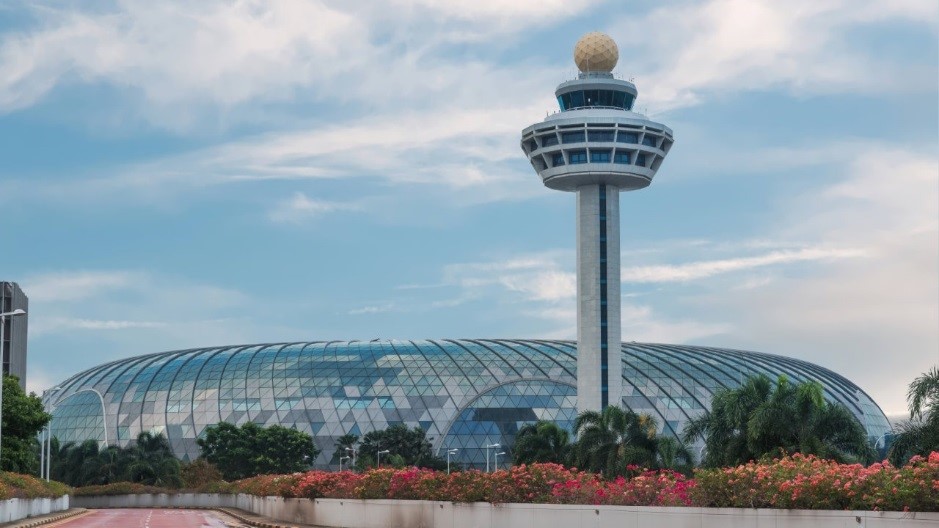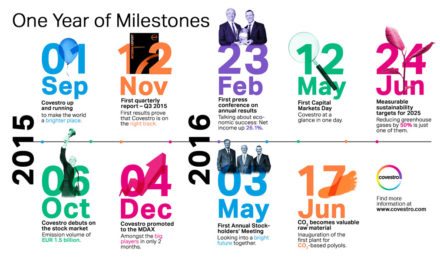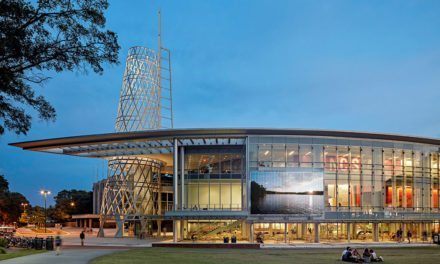SOLARBAN 72 STARPHIRE ULTRA-CLEAR and SOLARBAN 70 glasses integral to building’s operational, environmental performance
Vitro Architectural Glass announced Friday that Solarban® 72 Starphire Ultra-Clear® and Solarban 70 solar control, low-emissivity (low-e) glasses were specified for Jewel Changi airport in Singapore, which features a multi-faceted glass dome covering 1.7 million square feet of terraced gardens, retail and restaurant space, lodging, terminal operations, a suspended glass-bottomed bridge and the world’s tallest indoor waterfall.
Designed by Safdie Architects, Cambridge, Massachusetts, the $1.2 billion structure incorporates more than 550,000 square-feet of Solarban 70 glass, which was selected for its exceptional combination of transparency and solar control, as well as its ability to support plant life, deflect and absorb radar signals, and to fulfill the specific acoustical demands of one of the world’s busiest airports.
Throughout construction of the building, which took nearly five years to complete, representatives of Vitro Glass worked with numerous consultants who prescribed specific tolerances for radar-absorption, radar-signal reflectivity, noise insulation, glare mitigation, light transmittance and overall occupant comfort.
The glass dome, which consists of a continuous grid shell supported by 14 ring-like columns and ring beam at the roof’s edge, extends more than 650 feet across its longest span. GnT Glass Company, Ltd., based in Guangdong Province, China, fabricated more than 9,000 triangles of double-glazed Solarban 70 glass, with no more than two units shaped precisely the same way. A 16-millimeter air space between the two panels in the insulating glass units (IGU) was specified to insulate against aircraft noise.
The Jewel also features two glass-walled pedestrian bridges. They were fabricated by Wujiang Golden Glass Technologies of China’s Jiangsu Province with Solarban 72 triple-silver low-e coating over Starphire Ultra-Clear glass, the industry’s most transparent architectural glass.
Annissa Flickinger, international architectural manager, Vitro Architectural Glass, said Solarban 70 glass was specified for the dome after a rigorous evaluation process. “There was a lot of competition for this project,” she explained. “After all the testing was done, the architect determined that Solarban 70 glass was the best fit. The legacy we established with other high-profile international airports, such as Suvarnabhum International Airport in Bangkok and Queen Alia Airport in Amman, further confirmed their trust in us.”
In a standard 1-inch IGU with clear glass, Solarban 70 glass has visible light transmittance (VLT) of 64 percent and solar hear gain coefficient (SHGC) of 0.27, making it one of the highest performing products in the industry. Solarban 72 Starphire glass has a VLT of 68 percent and a SHGC of 0.28 in the same configuration.
To learn more about Solarban 70 or Solarban 72 Starphire glass, visit www.vitroglazings.com or call (855) VTRO-GLS (887-6457).
About Vitro Architectural Glass
Vitro Architectural Glass, part of Vitro, S.A.B. de C.V. (BMV:VITROA), the largest company of its kind in the Americas, manufactures a range of industry-leading, energy-efficient products such as Solarban®, Sungate® and Starphire Ultra-Clear® glasses at U.S. plants in Carlisle, Pennsylvania; Fresno, California; Salem, Oregon; and Wichita Falls, Texas. Committed to sustainable manufacturing processes and products, the company also operates one of the world’s largest glass research and development facilities in Pittsburgh and four residential glass fabrication plants in Canada. Upholding the values of “Together, We See Further” across the architectural, automotive and containers markets, Vitro strives to realize the power of partnership to ensure that projects meet or exceed ever-evolving sustainability expectations as well as glass requirements. For more information, please visit www.VitroGlassHub.com.




